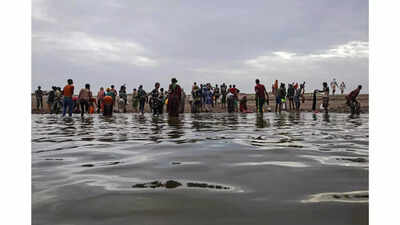An entire country is shifting to Australia, as first planned migration is underway

Tuvalu, a small island country in the Pacific Ocean, is preparing to carry out the world’s first planned migration of an entire nation. According to a Wired report, the migration is because of rising sea levels with multiple studies suggesting that much of Tuvalu’s land could be underwater within 25 years, forcing its people to move for survival.Tuvalu consists of nine coral islands and atolls with a population of just over 11,000. Its average elevation is only 2 meters above sea level, making it highly vulnerable to flooding, storm surges, and rising oceans caused by climate change.According to NASA’s Sea Level Change Team, sea levels in Tuvalu were 15 cm higher in 2023 compared to the previous 30 years. At this rate, most of the country’s land and infrastructure could be submerged by 2050.
Tuvalu citizens to get permanent residency in Australia
In response, Tuvalu and Australia signed the Falepili Union Treaty in 2023, creating a climate migration program. Under this agreement, 280 Tuvaluans per year will be granted permanent residency in Australia, with full rights to health care, education, housing, and jobs.The first phase of applications ran from June 16 to July 18. The Australian High Commission in Tuvalu reported “extremely high levels of interest” with 8,750 registrations, including family members. The first 280 migrants will be selected by ballot on July 25.Australia’s Foreign Minister Penny Wong said the migration program would allow Tuvaluans to settle “with dignity as climate impacts worsen,” while Tuvalu’s Prime Minister Feleti Teo has urged global action, calling for a new international treaty to protect the rights of nations facing sea level rise.Experts estimate that, combining this program with other migration pathways to Australia and New Zealand, up to 4% of Tuvalu’s population could migrate each year. “Within a decade, close to 40 percent of the population could have moved—although some may return home or go backwards and forwards,” said Jane McAdam, a fellow at UNSW Sydney’s Kaldor Centre for International Refugee Law.



